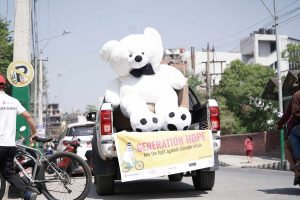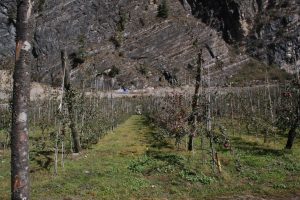
Kathmandu, December 2
As one of the countries most vulnerable to climate change, Nepal is going to lobby with the international community to limit global temperature rise to 1.5 degrees above pre-industrial levels, at the 24th meeting of parties to the UN Framework Convention on Climate Change.
“Even a 1.5 degree rise will have devastating consequences on Nepal and the Himalayas in particular,” said Maheshwar Dhakal, head of Climate Change Division at the Ministry of Forest and Environment. “The glaciers are melting and this will cause massive floods downstream,” he warned on the eve of the key meeting, set to begin in Poland this week.
According to Nepal’s status paper prepared ahead of the meeting, the government is going to call on state parties to revise their Nationally Determined Contributions (NDCs) by 2020 to raise their ambition in line with the latest available science, including the IPCC reports. “The current level of global ambition does not put us on a track to limit average global temperature rise to 1.5 degrees Celsius, therefore global ambition needs to be heightened up as soon as possible…,” says the paper.
Dhakal said that Nepal will continue to align with the LDC group during the negotiations. The UN Framework Convention, the Kyoto Protocol and the Paris Agreement clearly recognise the special circumstances and needs of the LDCs and this recognition must be adhered to in every delivery mechanism of the climate finance, says the document.
Nepal, which has a diverse landscape. is going to report to the world that it is already feeling the impacts of climate change: the number of rainy days is increasing significantly in the northwestern districts. Similarly, very wet days and extremely wet days are on a significantly decreasing trend, mainly in the northern districts. According to the paper, consecutively dry days are decreasing significantly, mainly in the northwestern districts of the mid-western region while consecutive wet days are increasing significantly in the northern districts of the mid-western region and central parts of the western and eastern regions. “Maximum temperature trends are higher than minimum temperature trends in all seasons.”
To address the situation, Nepal is going to insist that developed countries provide a clear roadmap with strategies and approaches to delivering US$100 billion by 2020. Nepal will call on developed countries to provide adequate and sustainable climate finance to supplement development assistance to address climate risk in the least developed countries. “Finance must target countries’ special needs and priorities, i.e. in the case of LDCs must prioritise adaptation whilst maintaining a balance between adaptation and mitigation,” says that government.
The government is going to lobby for an easier and simplified application, approval and disbursement processes for funds like the Green Climate Fund and the Green Energy Fund. Nepal, which has long been suffering due to climate change-induced disasters, will also call on state parties to ensure that the provisions of loss and damage included in the Paris Agreement be implemented. “The COP 24 should provide high-level guidance for the review of the Warsaw International Mechanism on Loss and Damage associated with Climate Change,” the paper says.
In the context of the Talanoa Dialogue, Nepal is going to call for collective guidance on the global effort needed to put the world on a pathway to below 1.5 degrees of temperature increase. “The IPCC special report on 1.5°C will be an important input to the Talanoa Dialogue. The findings of the report should be taken for consideration by the ministers and must feed into the political dialogue during COP 24. The outcomes of the dialogue must ultimately lead to a significant collective increase in emissions reductions before 2020 to put us on track to limit the global temperature increase to 1.5°C,” says the report.
This story is part of Onlinekhabar’s coverage on climate change under the 2018 Climate Change Media Partnership, a collaboration between Internews’ Earth Journalism Network and the Stanley Foundation.























